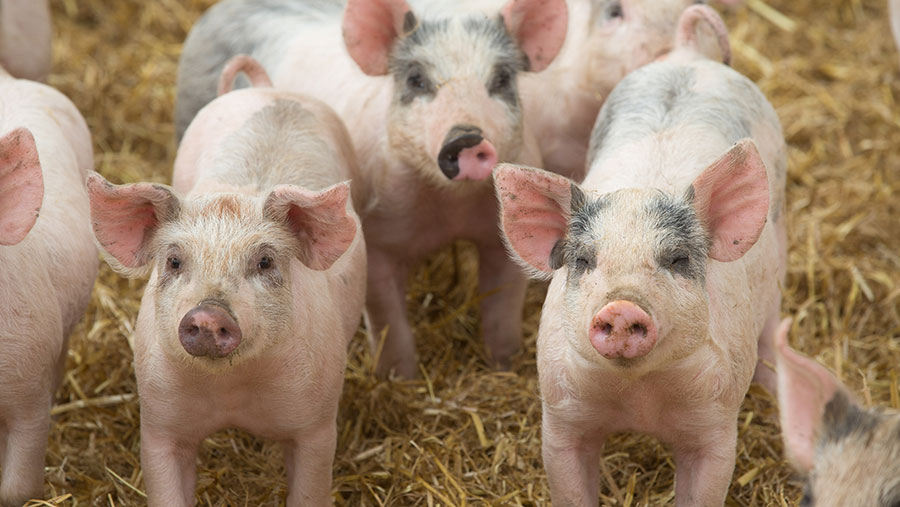Pig sector in crisis talks amid devastating price slump
 © Tim Scrivener
© Tim Scrivener Pig producers are losing more than 20p/kg as prices slump amid an oversupply of pigmeat in Europe and a growing backlog of out-of-spec finishers on farms.
The drop below breakeven levels was calculated by AHDB Pork and equates to a loss of about £18 a pig for the average 89.54kg carcass.
The AHDB has blamed rising feed costs and pig prices that have sunk close to the 140p/kg mark.
See also: How to get pig housing conditions right for best performance
Crisis talks
The dire situation has prompted crisis talks between the supply chain, retailers and the government.
Both Defra secretary George Eustice and farm minister Victoria Prentis joined the discussions, organised by the National Pig Association (NPA), on Tuesday (9 February).
Speaking after the event, NPA chief executive Zoe Davies welcomed the government’s firm commitment to finding a solution for the sector.
But she said the outcome of the talks had stopped short of a financial aid package.
Instead, retailers at the talks pledged to take more British pork and bacon, and were confident that the demand was there for UK products, Dr Davies reported.
Processors stated they were willing to begin Saturday shifts to help clear the backlog of pigs on farms.
However, the main call from the processing bodies was for the government to urge China to again allow exports from British abattoirs. Some UK abattoirs have been delisted by customers in China due to fears over Covid-19. Increasing exports to China is a longer-term solution.
“We may yet have to seek a support package if no other solution can be found to help producers who are suffering right now,” Dr Davies said.
Scottish Pig Producers chief executive Andy McGowan also welcomed the positive talks and a suggestion that adding abattoir workers to the skills shortage list would help offset reduced staff numbers.
However, Mr McGowan agreed that help was needed right away.
“Along with the options discussed, we will be continuing talks with the Scottish government about an aid package,” said Mr McGowan.
“This is key to provide a more immediate solution to the crisis and to protect the sector from long-term damage.”
Market under pressure
Prices have been under pressure since China and other countries imposed a trade ban on German pigmeat in September last year.
The move was due to the discovery of African swine fever (ASF) cases in wild boar. Hopes that the ban would be short-lived have been dashed as ASF has risen to almost 700 cases.
It means more than 200,000t of pigmeat destined for the Far East has flooded the EU market, where prices have dropped to 113p/kg.
The UK’s post-Brexit, open-door policy for food imports means some buyers have capitalised on cheap pigmeat, displacing UK product from the shelves.
In Scotland, Tesco and Asda stores had just 50% British pigmeat on offer, according to an NFU Scotland supermarket survey published this week.
Elsewhere, supermarket monitor Porkwatch’s statistics have shown a more stable situation.
Stringent export checks
While the government has fast-tracked European food imports to avoid the image of empty shelves after Brexit, UK exports have been hit by more stringent checks.
Scottish Pig Producers co-op chief executive Andy McGowan claimed food lorries from the EU were driving through British customs “without having the backdoors opened”.
But exports from Britain were being subjected to lengthy checks and even having to unload, particularly at the Dutch port of Rotterdam.
British Meat Processors Association chief executive Nick Allen suggested about 15% of UK shipments were checked, compared with just 1% from New Zealand.
It means delays for shipments are mounting.
Prior to Brexit, pigmeat would arrive in Europe the day after slaughter. Now it doesn’t arrive until four days later, and a loss of quality for some consignments has led to rejections.
The extra paperwork, labour and time required has led to pigmeat exports to Europe slumping to 50% of the pre-Brexit level.
The situation has been made worse by Covid-19 outbreaks at UK processors.
Meanwhile, measures to curb the spread of the disease have added to the difficulties and reduced throughputs and this, combined with the lack of export markets, has seen demand fall away.
Estimates suggest that this has caused a backlog of more than 100,000 finished pigs on British farms.
The two-week closure of the Brechin plant in Scotland contributed 15,000 pigs to that backlog and, as production continues, farms have found themselves facing increasing pressure on accommodation and crippling costs.
A pig farmer’s view
Brechin plant supplier and Scottish Pig Producers board member Sandy Howie has more than 1,000 extra pigs on his 350-sow breeder finisher unit compared with a year ago.
Mr Howie explained that no pigs had left Baluss Farm for three weeks while the Brechin plant was closed after an outbreak of Covid-19 among staff.

Sandy Howie © Scottish Pig Producers
The Aberdeenshire farm has had to quickly convert cattle sheds on the unit into straw yards, but Mr Howie said other farmers were struggling to find accommodation during the winter housing period.
Feed costs due to higher prices and the extra 1,000 pigs were up by £500/day compared with a year ago.
He estimated that the extra costs associated with housing, straw and water amounted to about £1.20 a pig a week.
Added to the cost, there is now no market for the heavier pigs because buyers don’t want out-of-spec animals.
Mr Howie has opted to continue to supply on-spec animals as they become available, and he is considering selling the larger pigs as culls at just 10-20p/kg to cut losses associated with maintaining them.
